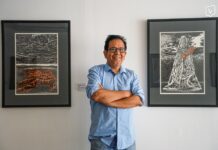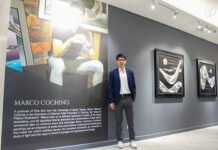ONE OF the country’s foremost writers in English expressed his regret in failing to acquire a working knowledge of Spanish.
“One of my regrets is that I didn’t master the Spanish language,” new National Artist F. Sionsil Jose said in “A Spanish Detour,” a forum at the Instituto Cervantes last July 11. He emphasized, however, that the study of the language must not be forced on anyone. One should learn it in his own will and interest.
A senior associate at the UST Center for Creative Writing and Studies (CCWS), Sionil recounted reading the classic “Don Quixote” when he was in grade school, adding that he was introduced to Spain by Miguel Cervantes – “the noble Spain that we should know more about.”
Before that, he also read Jose Rizal’s novels and “wept” in that part of “Noli Me Tangere” where Sisa’s sons, Crispin and Basilio, were unjustly punished by a Spanish friar for allegedly stealing money.
“Spain was in that village where I was born,” he said, referring to Rosales, Pangasinan, the inspiration of his world-famous five-volume epic saga that surveys the more tortuous chapters of Philippine history.
He also recounted that the things sold in his village store were goods from Spain like Cerveza Negra and “anisado.”
The landlords in Rosales were Spanish mestizos. “One of my earliest memories of them was how they came thundering down the village street on giant castaño horses and to get away from harm’s way, I cowered behind our bamboo fence,” he recalled.
Genuine Ilocano meets Madre España
In 1955, when Frankie first went to the United States on a US State Department grant, he decided to return to the Philippines via Spain. He remembered bringing with him a Spanish–English dictionary knowing that his college Spanish from UST, where he took up Litt. B. Journalism, was inadequate.
“I remember best, my entry in Madrid. In 1955, there were so few Filipinos in Spain then, mostly at our embassy. And right at the immigration when I presented my passport, the officers grinned and called me “hermano.” “Of course, it is very different now with thousands of Filipinos working in Spain.”
Frankie visited the usual tourist spots and the museums. He marveled at how beautiful and dark the churches were in Spain.
He said that the peak of his visit was the bullring. “I saw the bull charge—those sharp horns missing the matador by just a few millimeters. In fact, during that afternoon, one of the matadors was gored and had to be rushed out of the ring in a stretcher while a flurry of capes tried to distract the bull.”
Frankie related that one of the non-Asian ethnic groups that fascinated him was the Spanish Basques because they remind him so much of his own people, the Ilocanos. That’s why it was inevitable that he had to visit the Basque region, and that opportunity, he said, came in 1960.
That year, he attended a cultural conference in Berlin and made a side trip to Spain. He asked a friend to locate for him an inn in a Basque village where he stayed for a month to write. “I was then putting into final shape my first novel, The Pretenders.
He stayed for a month in the village of Marquina to finish his first novel. He was alone there and was away from the hassles of Manila. “I had all the time to think. There I decided to embrace revolution—a continuation of 1896—as the viable solution to our social inequities. So in The Pretenders, the main character commits suicide – a metaphor for the destruction of the rotten order before rebuilding can take place.”
Five years ago, he returned to Spain with his wife. “I was then working on Viajero, a novel about the Filipino diaspora. The plot of the novel compelled me to visit Spain again, to flesh out the chapters on the voyage of Magellan, the galleon trade, and the illustrado exiles in the 1880’s.”
They visited Prado, Madrid, and Seville where they enjoyed the most. “The train we took (to Seville) was not express. I wanted my wife to see the rocky, desolate countryside.”
“It was sheer pleasure to walk the narrow streets of Seville,” he said. They came across a street, Jovellanos, which is his wife’s family nameand took a picture of her underneath the street sign.
There was always the heady smell of Jasmine because of the orange trees that lined up the streets. He was curious why the oranges were not harvested. ”I picked one – it was uneatable because it was bitter.”
Recent visit and insights
In June last year, Frankie flew to Spain with his wife and discovered how Spain had changed. In Barcelona, the Ramblas had vastly changed according to him. “Now, on both sides of the street were sideshows, jugglers, mimics, singers, and itinerant musicians.”
He also noticed how Bilbao had changed. “My memory of Bilbao in 1960 was that of a decrepit and grimy industrial city. Now it had the spanking shine of the big cities of Europe, beautiful boutiques, mansions, a clean and efficient subway.”
He also went back to Marquina. “Now, there are tall apartment blocks at the approaches to the village,” he said
“Spain has changed. Democracy is flourishing although there are constant reminders that the spirit of anarchism is very much alive. The new energies of a nation that once created an empire where ‘the sun never sets’ are at work, actively linking Spain to Europe and the world.”
Frankie feels that Filipinos are not aware of the changes in Spain, perhaps because of the distance between Spain and the Philippines – “a distance not just of geography but of perception and deductions from a past that do not apply to the present.”
“But history is history. We can learn from it, derive from it tremendous strength if we are not bound to it by either necrophilia or senseless tradition,” he said. “Once Spain was the sick man of Europe, just as the Philippines is today, the sick man of Southeast Asia.”
When asked why Filipinos emphasize the shortcomings of the colonizers, he said that it is easier to criticize their vices because it is also easier to adopt them.
“We had inherited the vices of our colonizers, be they Spaniards, Americans or Japanese. Isn’t it time that we studied their virtues and stopped mouthing the slogans of an inward-looking nationalism? Can we put into the trash, can the ideas of people like Claro M. Recto and Lorenzo Tañada?”
Frankie also shared what he learned from the Republican ambassador to the United States, Salvador de Madariaga, as he quoted him: “A country need not be a colony of a foreign power—it can well be a colony of its own leaders.”
Frankie said that it’s very hard to quantify how much the colonizers influenced us. “I think it is something like this: You scratch the surface, and beneath the American or Spanish veneer, is something very Asian and very Filipino. And that’s what I would like to see develop one day,” he said.












